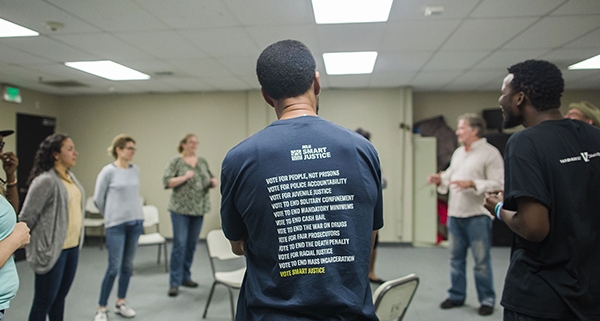Program explores criminal justice through plays

Every Tuesday and Thursday, students sit in a circle inside Shrine Auditorium to write and rehearse lines with formerly incarcerated people, rehearsing for “Performing Policy: The Justice Project,” an open-ended play that discusses criminal justice conflicts that will be performed in April.
As part of “Performing Policy,” students work with felons who bring their lived experiences to theater performance, deepening students’ understanding of the penal system by allowing them to explore a scenario of restorative justice. Restorative justice is a form of criminal justice that explores reformation rather than punishment through communication between victim and offender. The play purposefully presents conflicts without offering solutions, challenging audiences to reach restorative solutions.
Launched last January, the project aims to reform the criminal justice system by giving incarcerated people opportunities to heal and deal with their issues through theater rather than suffering for the actions they may have carried out unintentionally or unknowingly.
“This methodology brings the power of narrative, of playwriting, staging and performing into the hands of the people who are most affected by the story,” said Brent Blair, a leader of the project and a professor of theater practice in voice and movement and head of Theater and Social Change.
It encourages victims and their perpetrators to communicate through a medium that is beneficial and justifiable for both, Blair said. In many cases, those who are incarcerated committed crimes as minors and realize the gravity of their actions later, he said.
“This movement encourages dialogue to be fostered between perpetrators and victims to try and arrive at some mindful conversation about what justice and restoration would look like for both,” Blair said. “How do you move forward to healing if you don’t let the two sides speak to each other?”
Tobias Tubbs and Christian Branscombe, both charged and convicted of murder, are rehearsing with students to produce a realistic scenario for the stage. In 1991, Tubbs was convicted in aiding and abetting a murder-robbery. He pursued restorative justice in the aftermath of his crime and uses his experience to help write, rehearse and perform a production with the Justice Project.
“I was arrested as an adolescent,” Tubbs said. “I fight to change the laws of juvenile sentence, and now it’s known that our brains were not even formed enough to cultivate our adult minds, so we have to be given some form of relief or opportunity to prove our humanity and self-worth.”
Tubbs’ experience with restorative justice brought him closer to many people, including victims, and helped in his process of healing.
“It took 30 years of diligence experiencing the penal system, but at the same time, I met some of the most enlightened, wonderful, courageous and bold people,” Tubbs said.
After receiving a grant from Arts in Action, Blair and his colleagues decided to further explore restorative justice through forum theater, a form of theater that explores social justice and solutions to oppression in a performance.
The project links the Price School of Public Policy and the School of Dramatic Arts in an effort to practice forum theater.
“I think the community partners — their stories and their commitment to making communities better — are really inspiring,” said Jocelyn Poe, a Price faculty member and leader of the project. “The ways they want to give back to the community and the ways that they have shared their lives and their stories with this project has been really inspiring.”
The work produced by 40 students this semester will culminate in a performance in which the audience is welcome to get involved. Viewers are asked to participate in the play and communicate with performers.
“It becomes a real forum,” Blair said. “The entire audience gets involved, not by watching the play, but by standing up, getting out of their seats and participating in the play.”
Blair said that part of the reason he and his colleagues are exploring restorative justice is because, despite having 5% of the world’s population, the United States is home to 25% of the incarcerated population worldwide.
Members of the class who wish to get more involved with the project are encouraged to work with Blair and Poe into the summer once classes end. Over the summer, the Justice Project will have discussions with individuals capable of reform, including Rep. Karen Bass.
Blair said the project’s goal during the summer is to get Bass involved in the Justice Project and invite her to watch and join the performance so audience members can ask her serious questions about reform.
Poe hopes the project can raise awareness about pressing criminal justice issues and bring about solutions to them.
“I hope to see people really understand restorative justice and the implications of it and how to create good policies around it,” Poe said.
Students who remain through the summer will perform a final production of the play “Legislative Theatre.” It will include legislative changes to the story, that Blair hopes will enable “healthy dialogue and reform.”

